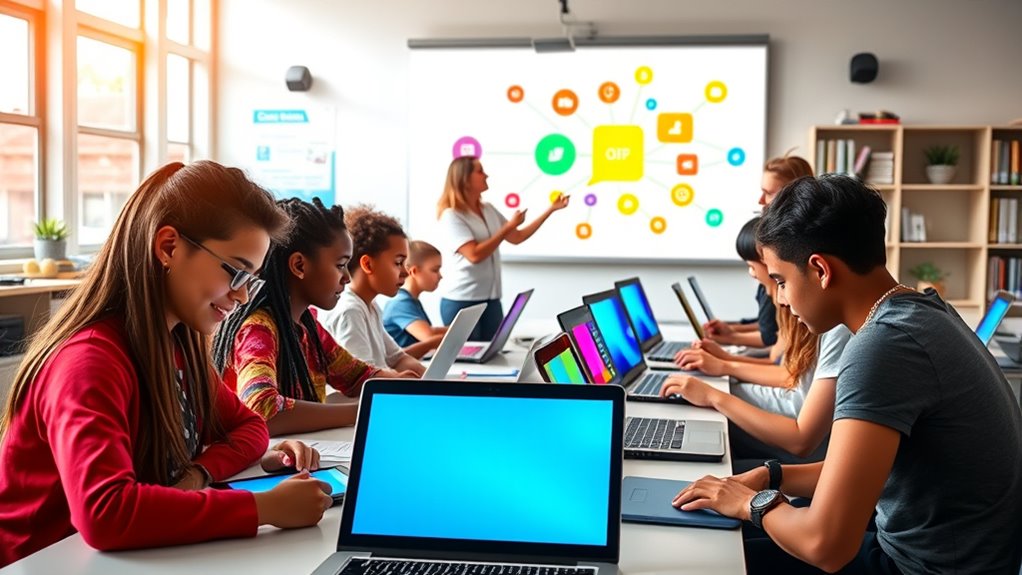Digital literacy is now a fundamental skill you need to succeed and stay connected in today’s digital world. It involves finding, evaluating, creating, and sharing information across different platforms, while also understanding online safety and societal influences. As technology evolves, so do the skills required, making ongoing learning essential. Developing digital literacy boosts your confidence, helps you navigate new tools, and opens doors to personal, professional, and civic opportunities. Keep exploring to discover more about this essential skill.
Key Takeaways
- Digital literacy is essential for effective participation in modern personal, professional, and civic activities.
- It encompasses skills in finding, evaluating, creating, and sharing digital information responsibly.
- As technology evolves, continuous learning and adaptation are vital to maintain digital competence.
- Bridging the digital divide ensures equal access and opportunities for all populations.
- Developing digital literacy enhances critical thinking, cybersecurity awareness, and societal engagement.
Understanding Digital Literacy and Its Scope

Understanding digital literacy begins with recognizing that it encompasses much more than just knowing how to operate devices or software. It’s about your ability to effectively find, evaluate, create, and share information across digital platforms. This skill set combines technical know-how with critical thinking, emotional intelligence, and social awareness, enabling you to navigate complex digital environments confidently. Digital literacy isn’t limited to computer skills; it includes media literacy, cybersecurity awareness, and understanding how digital tools influence society. As technology becomes deeply embedded in daily life, developing these competencies helps you participate meaningfully in personal, professional, and civic activities. Recognizing the broad scope of digital literacy allows you to adapt and thrive in an increasingly connected world. Building digital literacy skills also involves understanding media literacy and the influence of digital content on society.
The Growing Importance of Digital Skills in Society

You need digital skills to stay connected, participate, and succeed in today’s society. As more aspects of life move online, bridging the digital divide becomes essential for equal opportunities. Developing these skills guarantees everyone can engage fully in our increasingly digital world. Mastering digital literacy is now a fundamental requirement for navigating modern technology effectively.
Digital Skills for Engagement
Digital skills have become essential for meaningful participation in today’s society, shaping how you engage with civic duties, social interactions, and economic opportunities. When you can navigate online platforms, you can stay informed about current events, express your opinions, and participate in community discussions. Digital skills also enable you to access services like voting, healthcare, and education, which increasingly rely on online systems. In social contexts, you connect with friends, collaborate on projects, and share ideas across digital channels. Economically, these skills open doors to remote work, freelance gigs, and new markets. Developing your digital skills ensures you’re not just a consumer but an active contributor, capable of influencing and shaping your community and society at large. Additionally, understanding basic digital safety practices helps protect your personal information and ensures a safer online experience.
Bridging the Digital Divide
Why does bridging the digital divide matter more than ever in today’s society? Because access alone isn’t enough—you need digital skills to participate fully in social, economic, and civic life. Without equitable opportunities, many remain offline or lack the ability to navigate digital tools effectively. This gap limits job prospects, education, healthcare, and community engagement for underserved populations. Bridging the divide means not just providing devices or internet but also ensuring people develop the necessary skills to use technology confidently and securely. It involves targeted investments, inclusive policies, and innovative solutions like mobile learning and low-cost devices. Closing this gap empowers individuals, fosters economic growth, and promotes social inclusion, making digital literacy a crucial step toward a fairer, more connected world.
Core Competencies That Define Digital Literacy

Understanding the core competencies of digital literacy helps you navigate today’s digital world effectively. These skills include finding and evaluating information, communicating clearly online, and staying safe from cyber threats. Mastering these areas enables you to participate confidently in personal, professional, and civic spaces. Familiarity with digital tools and platforms enhances your ability to adapt to new technologies and improve your digital skills.
Essential Digital Skills
What are the core skills that define digital literacy? These essential digital skills include the ability to find and evaluate information online, use digital tools confidently, and communicate effectively across platforms. You need to operate devices such as computers, tablets, or smartphones, and navigate software or web applications smoothly. Cybersecurity awareness is also crucial—you should recognize threats, protect your data, and stay safe online. Additionally, understanding how to collaborate digitally and adapt to new technologies ensures you stay relevant in today’s fast-changing environment. These skills form the foundation for personal growth, workplace success, and civic participation, enabling you to engage meaningfully in a digital world. Developing a strong understanding of digital tools and platforms is vital for maintaining competitiveness and staying informed. Mastering them creates a solid base to build broader digital competencies.
Critical Competency Areas
Have you ever considered the key skills that truly define digital literacy? These core competencies form the foundation for effective participation in today’s digital world. You need to develop:
- Information literacy: Find, evaluate, and ethically use digital info.
- Technical skills: Operate devices, software, and digital tools confidently.
- Digital communication: Share ideas clearly and collaborate online.
- Cybersecurity awareness: Recognize threats and protect your data.
- AI/automation literacy: Understand and work with AI tools and systems.
Mastering these areas helps you navigate digital environments safely and efficiently. They’re essential for personal growth, professional success, and informed citizenship. As technology evolves, strengthening these competencies ensures you stay adaptable, responsible, and capable in a digital-first society. For example, understanding cybersecurity awareness is crucial to safeguard your data from potential threats.
Challenges in Achieving Widespread Digital Fluency

Why does achieving widespread digital fluency remain a significant challenge despite rapid technological advancements? Many factors contribute. First, access alone isn’t enough; meaningful skill development requires ongoing training, infrastructure, and support, which are often lacking. Socioeconomic disparities create digital divides, leaving marginalized communities behind. Additionally, the rapid pace of change means skills can quickly become outdated, demanding lifelong learning that many aren’t prepared for. Teacher training gaps and outdated curricula hinder education efforts. Cultural resistance and fear of technology also limit adoption. Furthermore, digital literacy is multifaceted, encompassing technical, cognitive, and emotional skills, making it difficult to address comprehensively. Recognizing the importance of emotional support can help individuals better adapt to technological changes. Without coordinated efforts, these barriers prevent many from reaching a level of fluency necessary for full participation in today’s digital society.
Integrating Digital Literacy Into Education Systems

Integrating digital literacy into education systems is essential for preparing students to navigate an increasingly digital world. You need to embed digital skills across curricula, ensuring they become a core part of learning rather than optional extras. Focus on teacher training to build confidence and competence in delivering digital content. Invest in infrastructure like high-speed internet and up-to-date devices to support access for all students. Develop engaging, relevant content that evolves with technology, emphasizing critical thinking and ethical use. Foster collaboration and digital communication skills through project-based learning. Regular assessment and feedback help track progress, while partnerships with industry can keep curricula aligned with real-world demands. Additionally, leveraging predictive modeling can help identify student needs and tailor instruction effectively. Prioritizing these steps guarantees students acquire the skills necessary for future success.
Future Trends and the Evolving Nature of Digital Skills

As technology continues to advance at a rapid pace, digital skills must evolve to keep up with new tools, platforms, and ways of working. You’ll need to develop adaptability, critical thinking, and AI literacy to stay relevant. Future digital skills will involve interpreting AI outputs, guiding automation, and managing complex data. Your ability to learn continuously will be vital, as job roles shift quickly and reskillings become common. Expect to work alongside intelligent systems, requiring skills beyond basic technical knowledge. Digital literacy will expand to include understanding digital ethics, cybersecurity, and the social impacts of technology. Staying ahead means embracing lifelong learning, experimenting with new tools, and cultivating a flexible mindset. The evolving digital landscape demands that you actively update your skills to thrive. Additionally, understanding the health benefits of various natural products can contribute to overall well-being and resilience in a fast-changing world.
Frequently Asked Questions
How Can Individuals Assess Their Own Digital Literacy Skills Effectively?
You can assess your digital literacy skills by testing your ability to find, evaluate, and use digital information effectively. Try tasks like troubleshooting common tech issues, creating digital content, or protecting your online data. Reflect on how confidently you communicate via digital platforms and your understanding of cybersecurity. Seek feedback from peers or utilize online assessments designed to measure your technical and critical thinking skills to identify areas for improvement.
What Role Do Cultural Differences Play in Digital Literacy Adoption?
Like Odysseus steering unfamiliar waters, you must recognize that cultural differences shape how people adopt digital literacy. You’ll find that values, language, and societal norms influence access, comfort, and trust in technology. By understanding these nuances, you can better tailor your approach, ensuring inclusivity and fostering confidence. Embracing diverse perspectives helps bridge gaps, empowering everyone to develop essential digital skills in a way that resonates with their cultural context.
How Can Underserved Populations Gain Access to Digital Literacy Resources?
You can help underserved populations access digital literacy resources by supporting initiatives that provide affordable devices, reliable internet, and tailored training programs. Partner with community organizations to deliver hands-on education in local centers, libraries, and schools. Use alternative technologies like solar-powered devices or voice-based platforms to reach those without traditional access. Advocate for government and private sector investments to bridge digital gaps, ensuring everyone gets the skills needed for today’s digital world.
What Are the Most Effective Methods for Teaching Digital Skills to Adults?
Think of teaching digital skills to adults like planting seeds in different soil types—you need tailored approaches. You can start with hands-on workshops, online courses, and community training programs that fit varying learning styles. Use simple language, practical exercises, and ongoing support to foster confidence. Connecting lessons to real-life needs helps adults see the value, making digital literacy a tool they can confidently wield in daily life.
How Does Digital Literacy Influence Personal Privacy and Data Security?
Digital literacy directly impacts your personal privacy and data security. When you’re digitally literate, you understand how to protect your information online, recognize threats like phishing, and use strong passwords and privacy settings effectively. This awareness helps you avoid scams, safeguard your data, and maintain control over your digital footprint. By staying informed and practicing safe digital habits, you reduce risks and make sure your personal information stays secure in an increasingly connected world.
Conclusion
As you navigate the digital landscape, embracing digital literacy becomes your gentle compass, guiding you through a world of endless information and connection. While the journey may have its subtle hurdles, developing these skills opens doors to new opportunities and understanding. By continuously honing your digital fluency, you guarantee you’re not left behind in the quiet tide of change. Remember, mastering digital literacy is less about perfection and more about staying gracefully adaptable in an ever-evolving world.









